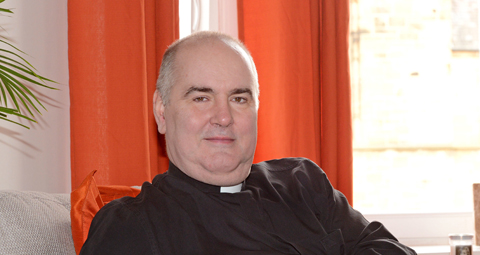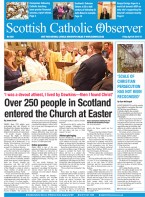BY Ian Dunn | June 22 | ![]() 0 COMMENTS
0 COMMENTS ![]() print
print

The need for truth and apologies
The Scottish Child Abuse Inquiry is now underway to the point where Lady Smith, the Chair, is hearing witnesses on behalf of different organisations involved in residential child care in Scotland within living memory. Many organisations within Scotland have been asked to report to the Inquiry and to give details about their involvement in such care, the Church is among them.
At the moment, the Inquiry seems to be examining the broad picture and learning about structures and how children came to be under the care of different establishments.
The work of the Inquiry will be complex and lengthy and will inevitably involve difficult press coverage for the Catholic Community. For that reason, I hoped that the Catholic Media would be a great resource in explaining the evidence given to the Inquiry in a way which helped Catholics understand the truth. I found myself fundamentally disagreeing with the angle which last week’s SCO used in covering the story of my testimony to that Inquiry. This article is designed to help clarify the story.
From the beginning, the Bishops of Scotland have been unanimous in their desire to assist and cooperate with the Inquiry and created a group which would prepare materials and respond on the bishops’ behalf. As a member of that group, I found myself standing in the Inquiry’s hearing room recently, raising my hand and swearing to tell the truth. Unfortunately, the SCO headline and story was presented last week, didn’t serve the complexity of the truth I tried to tell.
The Church in Scotland has apologised for the fact that children in our care suffered abuse, an apology re-expressed in our opening statement, acknowledging “An overwhelming sense of shame that these abhorrent crimes have occurred in the context of the Church” a sense of shame, “felt by all Catholics, by our men and women in parishes, by our religious, by our priests and deacons and by our bishops.” To understand how we came to this state of shame is important; we need to be open to examining all the aspects of the story and not looking for a one-size-fits-all theory.
In the context of discussing the way the Church handled accusations of abuse I was asked to reflect on a document issued by the Holy See in 1962 describing a process for dealing with such allegations. The responsibility to deal with this was the bishop’s and he was to do so by means of a Tribunal a “Church Court”. The world was changing and the Church was being asked to change too. The Church sought to engage with the modern world and to both learn from it and teach it. In the context of that opening out into the world, bishops began to use experts to advise on many matters they had handled on their own in the past. This advice included experts in psychology and therapy and they learned that many professionals believed that therapy could help and assist a person to reform and not reoffend. Since the bishops were not experts in psychology or therapy and the Church by her very nature sought to redeem and to save people, to turn them away from sin and back to God, this was welcomed. As Brother Brendan Geary noted in last week’s article, there was a mistaken belief, held very widely, that an abuser could be changed. It would take the world and the Church many years to discover how wrong that idea was. When faced with the choice of placing an abuser on trial before three Canonical (priest) Judges who had no formation in psychology or psychiatry or placing them into long term intensive therapy with experts guiding them to “change their ways”, the answer seemed obvious. It was equally obvious to the legal authorities, that on occasion that this was the appropriate response to a reported crime.
Nowadays it is obvious that abusers do not change, they are incurable and cannot be trusted, sadly and tragically that was only learned over time. It was not only the Church that learned this, but society too, as an ever-increasing knowledge was developed of the psychology of abuse and abusers.
If the Church made mistakes, as is willingly but sadly admitted, it did not make those mistakes out of malice or carelessness but rather in the hope of seeking to restore, repair, save. That is not meant as an excuse, but rather to cast a light on the truth and help us understand what happened. It does not make the pain and the suffering of an abused person any less real or any less inexcusable. It certainly does not mean as the headline claimed last week, that “Vatican II reforms contributed to child abuse mistakes.”
What if the Church had continued to use Tribunals through the 60s, 70s and 80s, and sentence abusers to a penalty that did not include therapy? Could we say that children would have been any safer, that things would have been different? I don’t think we could. It was not the reforms of Vatican II that caused mistakes – it was bad people doing horrible, evil things to innocents, it was superiors trying, with the best possible advice available at the time, to reform and change them. That was a mistake we made and that is why we needed to apologise, to those who suffered.










